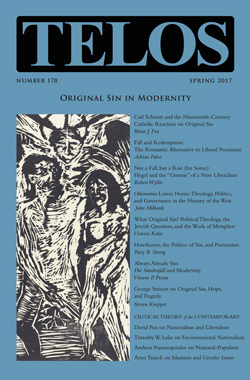In addition to its main focus on original sin in modernity, Telos 178 (Spring 2017) features a special section of topical writing, introduced here by Russell A. Berman, that continues our ongoing commitment to setting forth a critical theory of the contemporary. Telos 178 is now available for purchase in our store.
 Not that long ago, debates over politics were anchored in a clear opposition between universalism and relativism. Proponents of an inclusive structure of, at least aspirationally, all states—the new world order—envisioned an unchallenged entrenchment of democratic capitalism everywhere. Where dictatorships endured, as in North Korea, they were treated as bizarre outliers, exceptions that proved the rule of the progress of mankind toward Kant’s perpetual peace. Universalist values held sway; ultimately all rights were to become human rights, due to all humans solely on the basis of their humanity, implying that rights pursuant to national citizenship, to membership in any particular national community, would dwindle in significance: no borders, no sovereignty, no traditions. However this conceptual expression of globalization faced sophisticated critics, variously postmodern, which treated that universalism with disdain and suspicion, insinuating to it an imperial agenda and offering an alternative program of multiplicity, diversity, and multipolarity. That was the historical moment of the theoretical opposition between Habermas and Derrida, the universality of communicative reason versus the insistence on difference. Inclusion and integration stood opposed to multiculturalism, as did generally applicable norms to the particular claims of local culture and tradition.
Not that long ago, debates over politics were anchored in a clear opposition between universalism and relativism. Proponents of an inclusive structure of, at least aspirationally, all states—the new world order—envisioned an unchallenged entrenchment of democratic capitalism everywhere. Where dictatorships endured, as in North Korea, they were treated as bizarre outliers, exceptions that proved the rule of the progress of mankind toward Kant’s perpetual peace. Universalist values held sway; ultimately all rights were to become human rights, due to all humans solely on the basis of their humanity, implying that rights pursuant to national citizenship, to membership in any particular national community, would dwindle in significance: no borders, no sovereignty, no traditions. However this conceptual expression of globalization faced sophisticated critics, variously postmodern, which treated that universalism with disdain and suspicion, insinuating to it an imperial agenda and offering an alternative program of multiplicity, diversity, and multipolarity. That was the historical moment of the theoretical opposition between Habermas and Derrida, the universality of communicative reason versus the insistence on difference. Inclusion and integration stood opposed to multiculturalism, as did generally applicable norms to the particular claims of local culture and tradition.


